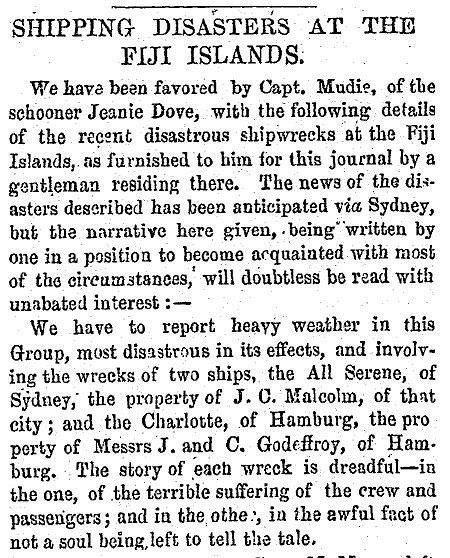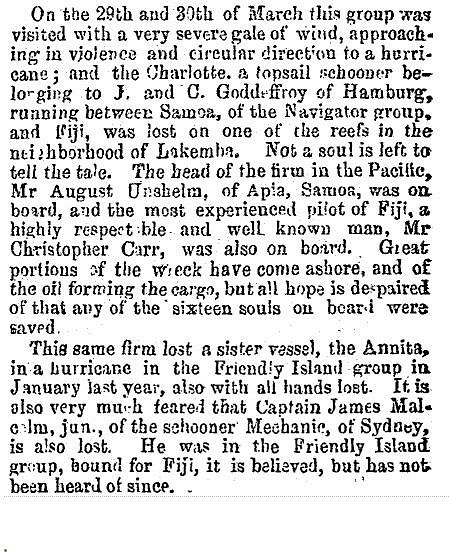T

TikiTomD
Grand Member (6 years)
Flagler Beach, FL
Joined: Sep 20, 2009
Posts: 700
|
T

JOHN-O, you honor me greatly by invoking the names of those true Masters of Tiki Archaeology, DustyCajun and Sabu... I am but a mere grasshopper in their presence. As for a trip to LA, even for business, that seems distant given the current high operational tempo we have here at the Cape. I am imposing on my colleagues to take a few days off in April to attend Hukilau.
Mangogirl, glad you’re enjoying the thread.
One more aside, please, before resuming and establishing how all of this connects to Dr. Funk’s story, as there are a couple of interesting items to cover regarding the South Seas agents of J.C. Godeffroy & Son...
In the post just above, August Unshelm was cited as the agent responsible for establishing Apia, Samoa as the regional trade headquarters for J.C. Godeffroy & Son, before his loss at sea in 1864. Here’s an old newspaper excerpt from the National Library of New Zealand that reports the circumstances of Unshelm’s death...
Otago Daily Times July 11, 1864


(part of article omitted here)

Unshelm’s youthful replacement, Theodore Weber, was called “the most remarkable man in the early history of Samoa” by Robert MacKenzie Watson. In his 1918 History of Samoa, Watson went on to say...
According to Robert Louis Stevenson, and indeed many others, his methods were a sort of skilful admixture of the tactics of Machiavelli and a caveman, but however that may be they seem at least to have gained him, as Stevenson freely admits, the respect of the whole community, white and native. By the end of 1869, that is in little upward of five years, he had as Trood says, "established a net-work of trading stations from New Britain on the north to Tongatabu on the south, including the Line Islands.” In the choice of his traders he took no account of nationality. For those seeking employment he had, it is said, but three questions, and all required affirmative answers: "Can you speak the language?" “Can you live among natives without quarrelling with them?” "Can you keep your mouth shut?" Two points of advice were given: “Have a woman of your own, no matter what island you take her from; for a trader without a wife is in eternal hot water;" and "Give no assistance to missionaries either by word or deed, beyond what is demanded of you by common humanity" - for the missionary taught the native that cloth or coin were better payment for produce than beads and tobacco.
In A Footnote to History, Robert Louis Stevenson said of Weber, after Weber’s death in 1889...
He was an artful and commanding character; in the smallest thing or in the greatest, without fear or scruple; equally able to affect, equally able to adopt, the most engaging politeness or the most imperious airs of domination. It was he who did most damage to rival traders; it was he who most harried the Samoans; and yet I have never met anyone, white or native, who did not respect his memory. All felt that it was a gallant battle, and the man a great fighter: and now when he is dead, and the war seems to have gone against him, many can scarce remember, without a kind of regret, how much devotion and audacity have been spent in vain. His name still lives in the songs of Samoa.
-Tom
|




